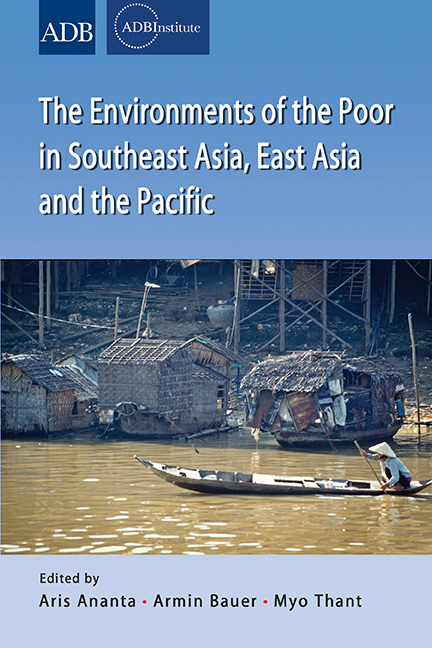Book contents
- Frontmatter
- Contents
- Preface
- List of Contributors
- Part I OVERVIEW
- Part II EAST ASIA (People's Republic of China and Republic of Korea)
- Part III PACIFIC ISLANDS
- Part IV MAINLAND SOUTHEAST ASIA (Cambodia, Thailand, Vietnam)
- 9 Poverty and the Environment in Rural Cambodia
- 10 Conservation Agriculture in Cambodia: A Triple-Win Option
- 11 Voices of the Poor on Climate Change in Thailand and Vietnam
- 12 Poor Thai Farmers' Adaptation to Climate Change
- Part V ARCHIPELAGIC SOUTHEAST ASIA (Indonesia, Malaysia, Philippines)
12 - Poor Thai Farmers' Adaptation to Climate Change
from Part IV - MAINLAND SOUTHEAST ASIA (Cambodia, Thailand, Vietnam)
Published online by Cambridge University Press: 21 October 2015
- Frontmatter
- Contents
- Preface
- List of Contributors
- Part I OVERVIEW
- Part II EAST ASIA (People's Republic of China and Republic of Korea)
- Part III PACIFIC ISLANDS
- Part IV MAINLAND SOUTHEAST ASIA (Cambodia, Thailand, Vietnam)
- 9 Poverty and the Environment in Rural Cambodia
- 10 Conservation Agriculture in Cambodia: A Triple-Win Option
- 11 Voices of the Poor on Climate Change in Thailand and Vietnam
- 12 Poor Thai Farmers' Adaptation to Climate Change
- Part V ARCHIPELAGIC SOUTHEAST ASIA (Indonesia, Malaysia, Philippines)
Summary
The temperature in Asia increased at a rate of 0.1–0.3 degrees Celsius per decade from 1951 to 2000, while sea level rose and rainfall increased but with greater variation. Changes in weather resulting from climate change come in various forms: heat waves, droughts, floods and cyclones. These become more often and more intense, and interfere with human activities, including economic activities. Over the period 1990–2100, there could be a decline of up to 50 per cent in rice yield in Indonesia, Vietnam, the Philippines, and Thailand. Agriculture is therefore among the most affected sectors. Agriculture is also a major cause of climate change. For example, the emission of methane (CH4) from rice fields contributes to greenhouse gas. Agriculture therefore should be managed in a way that both mitigates and adapts to climate change. Adaptation is especially important for poor farmers who lack the resources needed to properly deal with the problems of climate change.
CLIMATE CHANGE AND AGRICULTURE
Changes in temperature, rainfall, and CO2 release are all critical to agricultural activities. Pests and diseases are also likely to change and therefore alter food productivity. Geographic changes to land affect their suitability for cultivating staple crops. Other negative effects include the reduction in the quantity of water and the loss of land due to rise in sea level. Climate change will most likely be experienced differently from one area to another. Some areas may benefit from increased temperature, especially those areas that currently have limited potential due to cold weather. Atmospheric CO2 may also speed up growth process of some plants. Rain-fed crops declined in South and Southeast Asia. Crop yields might increase by 20 per cent in East Asia and Southeast Asia. In Thailand, the effects on yields can be either positive or negative, depending on the CO 2 regime. Given the mixed findings, even if global effects were small or moderate, regional effects could be large and devastating — at least for some parts, such as Southeast Asia, which is among the most vulnerable places due to its high forestation and strong dependence on agriculture.
- Type
- Chapter
- Information
- Publisher: ISEAS–Yusof Ishak InstitutePrint publication year: 2013



